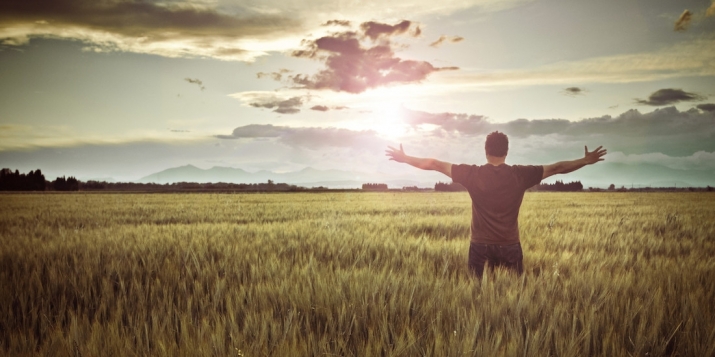FEATURES|THEMES|Commentary
Buddhistdoor View: Cultivating Gratitude this Holiday Season
 From huffingtonpost.com
From huffingtonpost.comToday is Christmas Eve. Apart from any religious and secular celebrations we may choose to observe, it is also commonly recognized as an opportunity to reflect on the past year. A lot will have happened; a year is inevitably filled with its share of disappointments, setbacks, and even tragedies. Yet as Thich Nhat Hanh always urges, we should not let regrets and sorrow paralyze our thoughts of the past. Nor should we allow nagging anxieties to catapult us into a yet-to-arrive future. Instead, the Buddhist tradition teaches us to remain grounded in the here and now, looking back with gratitude on all the things that have brought joy and learning into our lives. To be grateful for any kind of worldly success or prosperity goes without saying, but there are plenty of deeper things we can also be grateful for.
We sometimes forget that gratitude is another kind of mindfulness. Many of us find it easy to remember the faults of our family, friends, or colleagues. The active cultivation of personal gratitude is a powerful antidote to this fault-finding. A traditional Buddhist meditation is to remind ourselves that all sentient beings have been our mother at least once during our past lives. But we could begin by simply remembering one good deed that each person in our lives has done for us, be it a kind gesture or practical help. We will easily remember the kindness of those we look up to or love, but even something as trivial as someone paying for coffee when we had no cash could provide a grateful memory.
Remembering a good deed for each person also helps us to appreciate those with whom we’ve come into conflict. The point is not necessarily to change our opinions about people we don’t like, but to remind ourselves that gratitude, like compassion, should be extended to all beings. While we might feel grateful for all the good people and events in our lives, we might find it hard to extend the same goodwill to the people and events that have affected us in a negative way. Buddhism is a religion of equanimity and one that encourages us to look at things in different ways, so it suggests that we ask ourselves whether our challenging experiences have taught us anything. If indeed they have, could such experiences (even if unpleasant) really be considered entirely negative and not have some educational, beneficial element? The 8th century Indian Buddhist monk-scholar Shantideva put it best when he said he regarded those who had hurt him as his best teachers, and could not be more grateful for the trials they had put him through.
Buddhism also teaches us to be grateful for our circumstances, no matter what perceived difficulties we are enduring. Yes, there is great suffering in the world, ranging from natural suffering to the pain inflicted by humankind. Gross evil is a fact of samsara. Yet how marvelous, effuse the Chan masters, that we can breathe in and breathe out while being aware that we are doing so. It is magical to walk slowly and gratefully, reminding ourselves that each and every step is unique. In Chan and Zen, every moment is valued as unique, a little piece of eternity that, once gone from our minds, cannot be relived.
Buddhists with conservationist instincts stress an even grander vision of gratitude. This planet is a breathing, pulsing miracle. It is a little boat of life spinning at sixty thousand miles per hour in an endless ocean of solar systems, constellations, and black holes. It is an ecological jewel of sapphire and emerald that is at greater risk than ever from destruction at human hands. Greed, ignorance, and violence are driving forces that are inflicting staggering damage on the ecosystems that sustain sentient life, from our forests to our oceans. This form of destruction is perhaps the ultimate act of ingratitude and vandalism: the vandalization of our one and only home.
No wonder Thich Nhat Hanh’s writing in recent years has gravitated toward an almost pantheistic devotion to Mother Earth. He has also stressed the importance of relating to the planet in a grateful, reverent way. “We don’t need to address our prayers or express our gratitude to a remote or abstract deity with whom it may be difficult or impossible to connect. We can address our prayers and express our gratitude directly to the Earth,” he writes. “The Earth is right here. She supports us in very concrete and tangible ways. No one can deny that the water that sustains us, the air we breathe, and the food that nourishes us are gifts from the Earth” (Thich Nhat Hanh 2013, 20).
Finally, we can remember that just our encounter with the Dharma is incredibly precious, a blessed anomaly in the vast universe of time and space. The mixture of pleasure and pain we experience in the human realm is especially conducive to practice, and we can rejoice that we were born in a time and place where the teachings can be found. We can feel grateful for the incredible number of Dharma books that have been translated, and to our teachers for transmitting the teachings. We can be glad that we have an interest in practicing them, and that we have the conditions to do so. We can give our lives a purpose through the path.
Gratitude is a state of mind that we can live from day to day. It is a constant affirmation of our many good circumstances, but it is also a frequent reminder that we need to express our thanks. Whether it’s to Mother Earth, the friend we’ve lost touch with, Amitabha Buddha, or our own child, we can make our holiday—indeed every day—more meaningful by remembering all those we can thank for coming into our lives.
References
Thich Nhat Hanh. 2013. Love Letter to the Earth. Berkeley, California: Parallax Press.
See more














